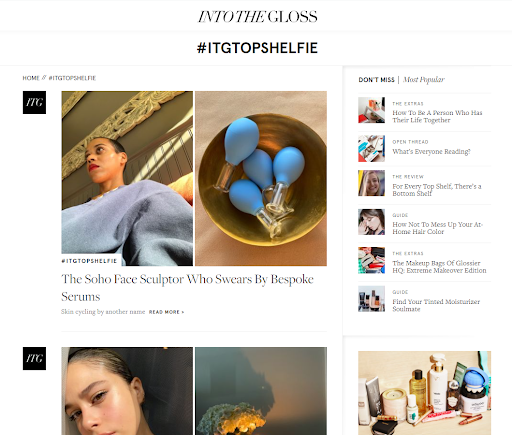Share this
Unconventional Ways to Promote Your Ecommerce Store
by Rin Mosher on Jan. 25, 2024

Running an ecommerce business is only getting more competitive by the day. It's not enough to simply have an online store - businesses that want any hope of being seen need to put extra work into promotional efforts. Even more than that, they need to find a way to differentiate themselves from the rest of the many other businesses trying to capture the same audience.
In this article, we explore six creative ways to market your ecommerce store in 2024. These lesser-known paths to publicity will help you build brand awareness and boost ecommerce sales, despite what the status quo says!
1. Try Guest Blogging
Authority is a main goal in marketing; brands establish it to frame themselves as industry leaders in the eyes of consumers. The more they trust a business' word, the more likely they are to purchase its products.
Brand authority can be created in several ways, with large marketing campaigns, competitor buy-outs, and sponsorships being just a few common - and expensive - examples. But as people begin to recognize the same old tactics, some brands are trying an alternative approach.
Blogs and articles are an extremely effective means of both gaining exposure and establishing your business as a thought leader in its space. Guest blogs, in particular, give companies the opportunity to speak directly to relevant audiences from a non-promotional and helpful angle. By providing advice or insight into topics that matter through a credible platform, they can establish themselves as experts and trusted sources of information. This creates a positive association with the brand and indirectly promotes its products or services.
For instance, let’s say you own a company that sells skincare products. You could write content for publications that cater to the same audience on relevant topics like managing sensitive skin, what to look for in a moisturizer, or nightly care routines. Readers will walk away with something valuable while having been familiarized with your name and brand.

Another benefit of guest blogging is that it has the capacity to build another kind of authority - domain authority - through backlinking. When high-quality sites publish content that links back to your own, Google sees it as a sign of reputability. So, not only does contributing elsewhere get the attention of relevant audiences, but it can also make your existing online presence more discoverable via online search engines.
Getting started with guest blogging may seem difficult, especially if you’re not a natural writer or PR expert. However, it’s not as hard as it may seem. Start by identifying reputable websites in your industry that accept guest submissions. Look for sites with a strong reputation, decent readership level, and relevant audience to maximize the impact of your post.
Then, reach out to the editor or content manager of those websites and pitch your idea. It could be an opinion piece, review, advice column, or maybe even an interview. Whatever the case, remember that the goal is not to promote your own products or services directly. Focus on providing valuable and informative content that will interest the audience at hand. Also be sure to personalize your outreach and explain how the website might equally benefit from publishing the final piece.
2. Provide Answers
Guest blogging isn’t the only way to position your ecommerce brand as a thought leader in your industry. It can be just as effective and cost-efficient to provide answers through other domains, like social media.
Providing answers to frequently asked questions on your website is a great way to build trust and establish authority with current and potential customers. However, you don't have to limit your knowledge to your own web domain. External forums like Reddit and Quora can be leveraged to reach a larger audience that’s actively looking for helpful answers. This not only boosts your brand's credibility but also increases the chances of potential customers discovering your products mid-journey.
Providing valuable information and answers positions your brand as genuinely helpful and customer-oriented. It's something outside of the sales pitch consumers are used to, and certainly something few ecommerce businesses take advantage of.
The key here is to focus on genuinely providing helpful and informative answers. You of course want to connect things back to your business in some way, but that shouldn't be the focus. Lead with value and don't make it contingent on a sale. Simply answer the question at hand and let your expertise incline people to want to learn more.
For example, you might come across a Quora thread asking for the best skincare products for sensitive skin. Instead of promoting your own, you could provide tips on how to read ingredient labels and identify potential irritants in products. Or you could recommend a few specific ingredients known for their soothing properties. The poster who asked the question, and anyone who reads the answers afterwards, will appreciate that insight and likely be more inclined to explore additional solutions on your website.
3. Form Partnerships
Partnerships are a key element of success in business growth, particularly in ecommerce. The space is highly influenced by online trends and the creators who steer them. In fact, 63% of customers trust a product recommendation from an influencer or celebrity more than a brand's own words.
Influencers’ opinions tend to come off as less biased and more authentic - almost like from the perspective of a friend. Partnerships are extremely easy to form nowadays too thanks to social media platforms’ rollout of ‘Sponsored’ and paid content.
It’s also worth considering strategic partnerships with other businesses in your domain. Cross-promotions and collaborations can expand your reach into new audiences while adding value for existing ones. And there are opportunities everywhere.
Take Stanley and Starbucks, for example. The two brands have leveraged their common ground in the beverage space to make Stanley's rugged, durable products a recognized accessory in the bags of everyday Starbucks enthusiasts.
4. Run Competitions and Giveaways
Sometimes, marketing dollars are best spent on customers themselves. Brands have used competitions and giveaways to excite the public about their products and gain name exposure for decades. Only now with social media, they're easier to launch and benefit from than ever.
Apps like Instagram offer built-in features like polls and contests to make running competitions effortless. One example of a successful contest is from skincare brand Glossier, which encouraged their followers to post photos using the hashtag #ITGtopshelfie for a chance to be featured on their website.

It didn't take nearly as much time or effort as running a PPC ad campaign would, yet the results were exceptional.
You can create your own contest or giveaway in plenty of creative ways. For instance, you could ask followers to repost and tag your brand for a chance to win a prize. Or perhaps have them engage with your content in some way, such as leaving a comment or sharing their favorite product from your line.
The key to success with competitions and giveaways is making them easy and fun for your audience to participate in. And don't forget the power of a well-designed prize - something that aligns with your brand but also has high perceived value for potential customers.
The competition itself will serve as a promotional campaign that naturally connects with consumers and their close networks. Afterwards, the lucky winner can become an advocate or success story for your brand, further spreading the word while boosting credibility and trust.
5. Experiment With Ugly Ads
The public has grown weary of conventional advertising. In fact, they're blind to it. Experts use the term 'ad fatigue' to describe this phenomenon. It's why the same old ecommerce marketing strategies you'd think would generate results aren't working. Today, standing out requires breaking the status quo entirely by showing consumers the last thing they expect to see - unpolished, visually disruptive content.
Ugly ads use unappealing colors, unflattering images, and tacky designs to go against everything we've been taught about creating visually appealing ads. But, that's precisely why they work. While it may feel like a bad idea when everyone else is striving for perfection, this is the kind of outside-of-the-box thinking that can make a campaign memorable.
Lots of high-profile brands have experimented with ugly ads and seen significant success. Burger King's 'Moldy Whopper' campaign, for instance, showcased burgers covered in mold to promote a move towards using no artificial preservatives. It was a bold and unconventional approach but garnered millions of views and widespread media coverage.
Ecommerce brands don't need to go this far to create ads that stand out. Sometimes, all you need to do is go back to the basics - like Crocs did with this ad campaign on Twitter/X.
Nobody's gonna know they're Crocs... pic.twitter.com/ZmX0HeOnnS
— Crocs (@Crocs) February 15, 2023
6. Start a Social Commerce Store
Although this next ecommerce promotion strategy takes some work, it's worth considering not just for the ecommerce marketing opportunities it can offer, but also for the potential revenue it can generate. Social commerce is a relatively new concept that combines social media and ecommerce to create unique shopping experiences for consumers on popular apps like Instagram and Facebook. These platforms have rolled out native features that allow businesses to list and sell products from their existing profiles, as well as promote their products through targeted ads.
TikTok Shop, for instance, has collaborated with major ecommerce platforms like Shopify, WooCommerce, and others to enable businesses to sell directly through TikTok ecommerce features. This is a great way for small businesses or entrepreneurs who are just starting out in the ecommerce world to get their products seen in new places and in more organic ways. Some experts believe that it won't just be a trend but a major shift in the way people shop over the coming years.
Trends and fads aside, if there's one thing about marketing that's remained consistent in the ecommerce world, it's that success comes to those who are willing to break the mold and try new things. Whether it's embracing new platforms or experimenting with different strategies, being open to change and adaptation is key in a constantly evolving industry.
Hopefully, the tips outlined in this blog have given you some ideas on how to effectively market your online store amidst increasing competition. When they work and orders begin pouring in, look no further than Shipfusion for ecommerce fulfillment. As an industry-leading third-party logistics (3PL) company with warehouses across North America, we're well-equipped to help your business successfully scale. Reach out to a member of our team to get started today.
Share this
You May Also Like
These Related Articles

6 Brand Collaborations That Paid Off (and What Made Them Successful)

The Best Social Commerce Platforms In 2024 with Benchmarks

The Importance of Sustainability in eCommerce
- April 2025 (18)
- March 2025 (26)
- February 2025 (26)
- January 2025 (37)
- December 2024 (16)
- November 2024 (23)
- October 2024 (22)
- September 2024 (27)
- August 2024 (9)
- July 2024 (8)
- June 2024 (5)
- May 2024 (8)
- April 2024 (8)
- March 2024 (6)
- February 2024 (6)
- January 2024 (5)
- December 2023 (3)
- November 2023 (3)
- October 2023 (5)
- September 2023 (4)
- August 2023 (2)
- July 2023 (1)
- June 2023 (4)
- March 2023 (2)
- October 2022 (1)
- September 2022 (5)
- August 2022 (4)
- July 2022 (7)
- June 2022 (4)
- May 2022 (4)
- April 2022 (6)
- March 2022 (2)
- February 2022 (1)
- January 2022 (3)
- December 2021 (2)
- November 2021 (4)
- October 2021 (2)
- September 2021 (5)
- August 2021 (4)
- July 2021 (4)
- June 2021 (3)
- May 2021 (2)
- April 2021 (3)
- March 2021 (3)
- February 2021 (3)
- January 2021 (2)
- December 2020 (4)
- November 2020 (2)
- October 2020 (4)
- September 2020 (2)
- July 2020 (5)
- June 2020 (4)
- May 2020 (2)
- April 2020 (2)
- March 2020 (4)
- February 2020 (1)
- December 2019 (1)
- May 2018 (1)
- March 2018 (2)
- February 2018 (3)
- January 2018 (3)
- November 2017 (3)
- July 2017 (4)
- March 2017 (3)
- February 2017 (5)
- January 2017 (3)
- December 2016 (4)
- November 2016 (6)
- October 2016 (6)
- October 2015 (1)
- September 2015 (1)
- June 2015 (3)
- May 2015 (3)
- August 2014 (1)
- July 2014 (1)
- March 2014 (1)
- February 2014 (1)